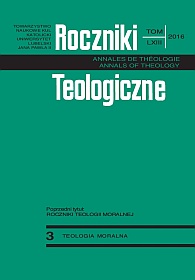Główne nurty w starożytnej etyce chińskiej
Abstrakt
Kultura chińska należy do tych dawnych tradycji, które w dużym stopniu zachowały swoje bogactwo do czasów współczesnych. Niniejszy szkic przedstawia starożytną etykę chińską w jej różnych nurtach, do których należy motizm, daoizm, legalizm i chińska wersja buddyzmu znana jako chan. Te rozważania poprzedzone zostały krótkim wprowadzeniem do konfucjanizmu, który jako nurt filozoficzno-etyczny zdecydowanie wyróżnia się spośród innych tradycji, a którego centralnym pojęciom etycznym szerzej poświęcone będzie kolejne opracowanie.
Bibliografia
Chan J., Confucian Attitudes toward Ethical Pluralism, w: Confucian Political Ethics, red. D.A. Bell, Princeton–Oxford: Princeton University Press 2008, s. 113-138.
Confucian Political Ethics, red. D.A. Bell, Princeton–Oxford: Princeton University Press 2008.
Confucius, The Analects, tłum. R. Dawson, Oxford: Oxford University Press 2008.
Dialogi konfucjańskie, tłum. K. Czyżewska-Madajewicz, M.J. Künstler, Z. Tłumski, Wrocław: Zakład Narodowy im. Ossolińskich 1976.
Fairbank J.K., Goldman M., China: A New History, Cambridge, USA–London, UK: The Belknap Press of Harvard University Press 2006.
Fraser C., Mohism and Motivation, w: Ethics in Early China: An Anthology, red. C. Fraser, D. Robins, T. O'Leary, Hong Kong: Hong Kong University Press 2011, s. 83-103.
Guang X., Buddhist Impact on Chinese Culture, „Asian Philosophy” 23(2013), nr 4, s. 305-322.
Hershock P., Chan Buddhism, w: The Stanford Encyclopedia of Philosophy [2015] www.plato.stanford.edu [dostęp: 22.03.2016].
Ivanhoe P.J., On Ethics and History: Essays and Letters of Zhang Xuecheng, Stanford: Stanford University Press 2010.
Lai K., Learning from Chinese Philosophies: Ethics of Interdependent and Contextualised Self, Aldershot: Ashgate 2006.
Lin L.-H., Ho Y.-L., Confucian Dynamism, Culture and Ethical Changes in Chinese Societies – a Comparative Study of China, Taiwan and Hong Kong, „The International Journal of Human Resource Management” 20(2009), nr 11, s. 2402-2417.
Littlejohn R.L., Confucianism: An Introduction, London: I.B. Tauris 2011.
Nelson E.S., Language and Emptiness in Chan Buddhism and the Early Heidegger, „Journal of Chinese Philosophy” 37(2010), nr 3, s. 472-492.
Nelson E.S., Demystifying Experience: Nothingness and Sacredness in Heidegger and Chan Buddhism. „Angelaki. Journal of the Theoretical Humanities” 17(2012), nr 3, s. 65-74.
Readings in Eastern Religions, red. H. Coward, R. Neufeldt, E.K. Neumaier, Waterloo: Wilfrid Laurier University Press 2007.
Schwartz B.I., The World of Thought in Ancient China, Cambridge, USA–London, UK: The Belknap Press of Harvard University Press 1985.
Wong D., Chinese Ethics, w: The Stanford Encyclopedia of Philosophy [2013], www.plato. stanford.edu [dostęp: 20.02.2016].
Wright A.F., Buddhism and Chinese Culture: Phases of Interaction, „The Journal of Asian Studies” 17(1957), nr 1, s. 17-42.
Yunping W., Confucian Ethics and Emotions, „Frontiers of Philosophy in China” 3(2008), nr 3, s. 352-365.
Zonggui L., Between Tradition and Modernity: Philosophical Reflections on the Modernization of Chinese Culture, Oxford: Chartridge Books Oxford 2014.
Copyright (c) 2016 Roczniki Teologiczne

Utwór dostępny jest na licencji Creative Commons Uznanie autorstwa – Użycie niekomercyjne – Bez utworów zależnych 4.0 Międzynarodowe.





